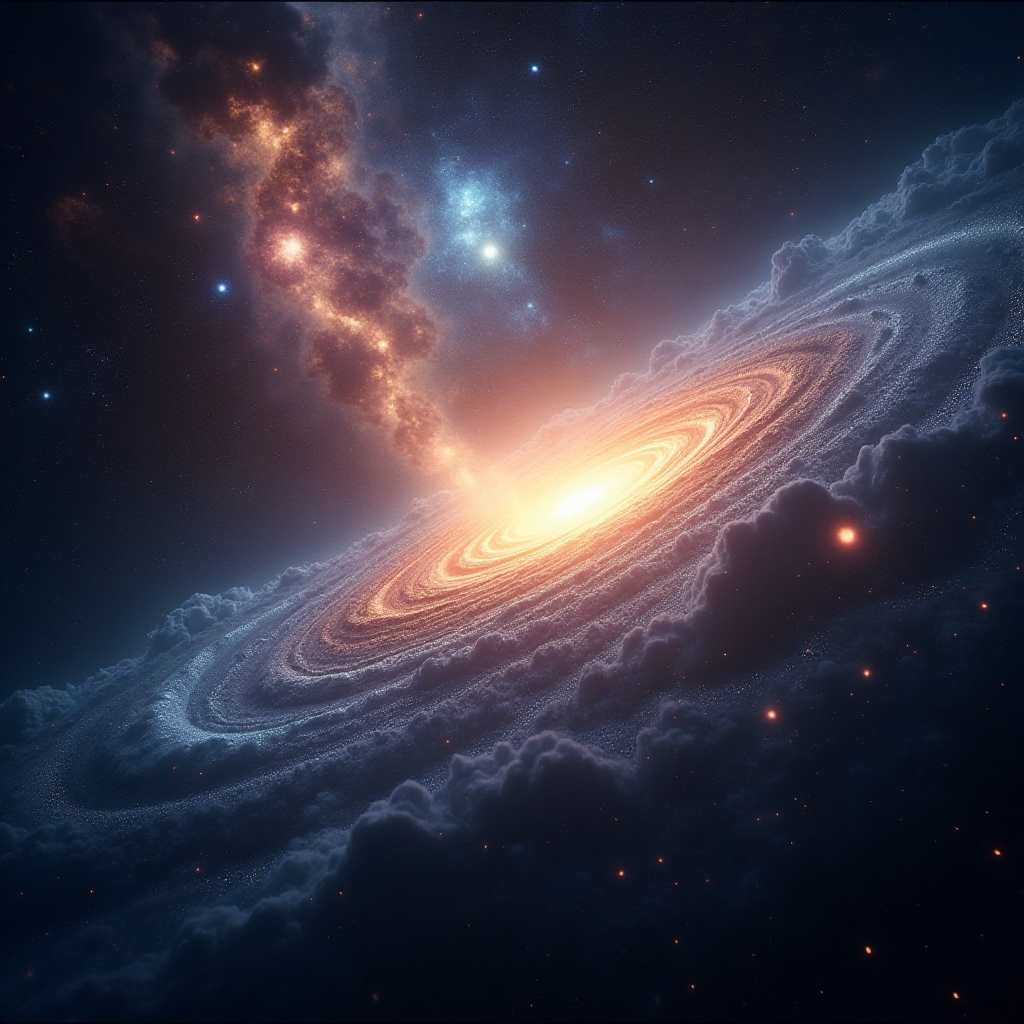Key Points
- Research suggests Stephen Hawking became an atheist through his scientific work, particularly the Big Bang theory, arguing time began with the universe, leaving no room for a creator.
- It seems likely that Hawking’s view was that science explains the universe without needing God, as seen in his book Brief Answers to the Big Questions (Stephen Hawking: There’s no God).
- The evidence leans toward religious critiques, like in Islam, viewing God as eternal and outside time, challenging Hawking’s temporal assumptions, with the Quran’s creation account (e.g., Surah Al-Anbiya 21:30) seen by some as aligning with the Big Bang (Big Bang Mentioned In Quran).
- This topic is controversial, with science and religion offering different lenses and interpretations of religious texts like the Quran being modern and debated.
Stephen Hawking’s Journey to Atheism
Stephen Hawking, a prominent physicist, was not born an atheist but became one through his research, especially his work on the Big Bang theory. He argued that since time itself began with the Big Bang, there was no “before” for a creator to act, thus negating the need for God. This perspective is detailed in his book Brief Answers to the Big Questions, where he stated, “There is no God. No one created the universe and no one directs our fate” (Stephen Hawking: There’s no God).
Religious Perspectives and Critiques
From a religious standpoint, particularly Islam, critics argue Hawking’s view is flawed because it assumes God is bound by time. In Islamic theology, God is eternal, existing before time and space, as seen in descriptions like “the One who has always existed.” In Surah Al-Anbiya (21:30), the Quran states, “Do not the unbelievers see that the heavens and the earth were joined together as one unit, before We clove them asunder?” Some modern interpretations see this as aligning with the Big Bang theory, suggesting the universe started as a single entity before expanding (Big Bang Mentioned In Quran). However, these interpretations are recent and not part of traditional commentary until after the Big Bang theory gained scientific acceptance.
Limitations and Balance
As Hawking emphasized, science can explain the “how” of the universe’s expansion but struggles with the “why” or the origin of the initial singularity. Religious perspectives fill this gap with metaphysical explanations, suggesting a creator beyond time. This debate highlights the limitations of both science and religion, with each offering different ways to understand the universe’s vastness and origin.
Stephen Hawking and the Denial of God
This note provides a detailed exploration of Stephen Hawking’s views on God, his scientific basis for atheism, and the religious, particularly Islamic, critiques of his arguments, including the alignment of Quranic verses with the Big Bang theory. It aims to present a balanced view, acknowledging the complexity and controversy of the topic, and is written for a lay audience with an interest in science and religion.
Background on Stephen Hawking’s Views
Stephen Hawking, a British theoretical physicist known for his work on black holes and cosmology, was an avowed atheist whose views evolved through his scientific research. His atheism was particularly influenced by his understanding of the Big Bang theory and the concept of time. Hawking argued that since time began with the Big Bang, there was no “before” in which a creator could have acted, thus negating the need for God.
This perspective is evident in his final book, Brief Answers to the Big Questions, published posthumously in 2018, where he wrote, “There is no God. No one created the universe and no one directs our fate” (Stephen Hawking: There’s no God). In interviews, such as one with El Mundo in 2014, he stated, “Before we understand science, it is natural to believe that God created the universe. But now science offers a more convincing explanation” (What Stephen Hawking said about God).
Hawking also addressed the fine-tuning of the universe, suggesting it could be explained by the multiverse hypothesis, where our universe is one of many, and the conditions for life are statistically inevitable rather than requiring a creator (Did the dying Stephen Hawking really mean to strengthen the case for God?). This naturalistic explanation was central to his rejection of a divine being.
The Big Bang Theory and Time
Hawking’s work on the Big Bang theory, which posits that the universe originated from a singularity about 13.8 billion years ago and has been expanding ever since, led him to conclude that time and space began with this event. This idea is supported by his final theory, published in 2018, which suggested a finite boundary at the Big Bang, defined by string theory and holograms, challenging the multiverse and simplifying the universe’s structure (Read Stephen Hawking’s final theory on the Big Bang). This temporal framework was key to his argument against God, as it left no room for a creator to exist before the universe.
Religious Critiques, Especially from Islam
Critics, particularly from religious perspectives, argue that Hawking’s reasoning is flawed because it assumes God is bound by time and space. In Islamic theology, God is described as eternal and transcendent, existing before time and space, as seen in the concept of “the One who has always existed.” This view challenges Hawking’s temporal assumptions, suggesting that the question of “what existed before the Big Bang” is irrelevant for an eternal creator.
The user’s query highlights the Quran’s description of creation, particularly Surah Al-Anbiya (21:30), which states, “Do not the unbelievers see that the heavens and the earth were joined together as one unit, before We clove them asunder?” Some modern Muslim scholars interpret this as describing an initial state akin to the Big Bang, where the universe was a single, unified entity before expanding (Big Bang Mentioned In Quran). This interpretation is supported by other verses, such as Surah Hadid (57:4), which mentions the creation from nothing, aligning with the scientific view of the universe’s origin from a singularity (The Big Bang Theory and the Quran).
However, it is important to note that these interpretations are modern and were not part of traditional Islamic commentary until after the Big Bang theory gained scientific acceptance in the 20th century. Historical tafsirs (commentaries) focused more on theological and metaphorical meanings rather than scientific ones, and some scholars argue that the Quran’s descriptions are not intended as scientific predictions but as spiritual guidance (Is the Big Bang mentioned in Quran?).
Specific Critiques of Hawking’s Arguments
The user’s query also critiques Hawking’s argument that the total positive and negative energy in the universe sums to zero, implying no need for a creator. This is seen as flawed, with critics arguing that even if energy balances to zero, it does not explain why the universe exists or why the laws of physics are finely tuned for life. For example, an article suggests this is like saying equal debit and credit in an account means no transactions occurred, ignoring the initial cause (Stephen Hawking Proves the Existence of God).
From an Islamic perspective, the Quran’s call to faith and understanding, as seen in Surah Al-Anbiya, invites reflection on the universe’s complexity and order, suggesting a higher intelligence behind it. This aligns with the argument that science has limitations, explaining the “how” but not the “why,” leaving room for metaphysical explanations (Quran and Science: Evolution, Big Bang, Embryology, ET Life and Beyond).
The Controversy and Balance
This topic is highly controversial, with science and religion offering different lenses to understand the universe. Hawking’s scientism, the belief that science alone can resolve all mysteries, is critiqued by religious scholars as ignoring metaphysical realities (My Visit with Professor Stephen Hawking). Conversely, religious interpretations of scientific theories can be seen as retrofitting, where texts are reinterpreted to fit modern discoveries, which some argue lacks historical basis (r/DebateReligion on Reddit).
The debate highlights the limitations of both fields: science can describe the mechanisms of the universe but struggles with existential questions, while religion offers metaphysical explanations not empirically testable. This interplay invites a balanced view, acknowledging that both faith and science share a quest for understanding, as seen in the Quran’s call to reflect on creation and science’s ongoing exploration of the cosmos (Has the Quran Predicted the Big Bang?).
Comparative Analysis: Science vs. Religion
To organize the comparison, consider the following table, which outlines key aspects of Hawking’s scientific view and the Islamic religious perspective:
| Aspect | Hawking’s Scientific View | Islamic Religious Perspective |
|---|---|---|
| Origin of Universe | Big Bang, no need for creator, time began then | Quran describes creation from nothing, God eternal |
| Role of Time | Time started with Big Bang, no “before” for God | God outside time, creation not bound by temporal limits |
| Fine-Tuning | Explained by multiverse, statistical inevitability | Seen as evidence of divine wisdom, precise order |
| Limitations | Science explains “how,” not “why” | Science has gaps, faith fills with metaphysical answers |
This table illustrates the fundamental differences and points of contention, highlighting the complexity of reconciling these views.


Unexpected Detail: Modern Interpretations
An unexpected detail is that while the Quran’s alignment with the Big Bang is often cited, historical Islamic scholarship did not interpret these verses scientifically until after the theory’s development. This modern reinterpretation, while fascinating, raises questions about whether it reflects divine foresight or a retrofitting to fit contemporary science, adding depth to the debate (Why do we not say that the Big Bang came before everything else?).
Conclusion
Stephen Hawking’s denial of God was rooted in his scientific understanding, particularly the Big Bang and time’s origin, but religious critiques, especially from Islam, challenge this by viewing God as eternal and outside time. The Quran’s verses, like Surah Al-Anbiya 21:30, are seen by some as aligning with the Big Bang, though interpretations are modern and debated. This interplay between science and religion underscores their complementary yet distinct roles in understanding the universe, inviting reflection on both empirical and metaphysical dimensions.


